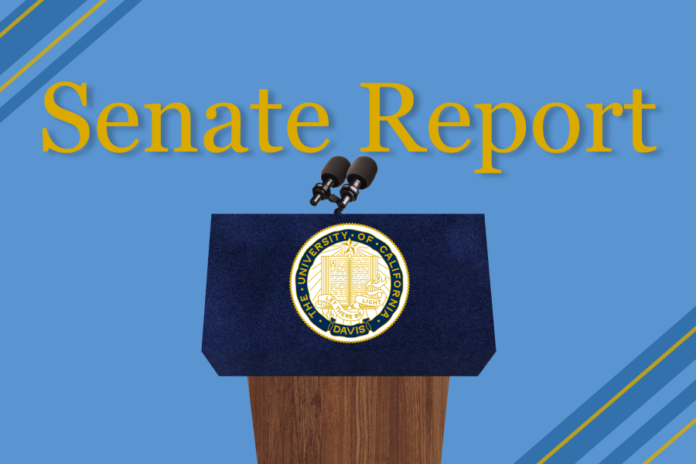The table also heard several quarterly reports from various committees
By RIVERS STOUT — campus@theaggie.com
Vice President Aarushi Raghunathan called the Feb. 22 meeting to order at 6:30 p.m. After roll call, she read the UC Davis Land Acknowledgement.
Following Senator Chasa Monica’s resignation from the position of Senate President Pro Tempore, the meeting then voted for a different senator to fill the role. Senator Chen nominated Senator Chow. As the only nominee, she was voted into the position unanimously.
Next on the agenda was the quarterly meeting with Unitrans. Jeffery Flynn, general manager of Unitrans, said that ridership had increased 20% this quarter. However, they are currently experiencing a driver shortage, as there is an excess of applicants but a lack of trainers. Unitrans asked for a training budget increase to account for this problem.
As far as what the community can look forward to in the future, a deal has been made to supply Unitrans with more electric buses. However, the buses will not be delivered to campus for a couple of years as they take a long time to manufacture.
Two students were next nominated to serve on the Undocuscholars Advocacy and Aid (UAA) Committee, an organization dedicated to serving undocumented students on campus. Both were unanimously approved.
The Sexual Assault Awareness Advocacy Committee (SAAAC) was next, also nominating two students to serve on the committee. Both were also unanimously approved.
SAAAC’s quarterly report followed, where they discussed the success of their monthly decompression workshops. New Narcan lockers, operated by the UC Davis Fire Department in collaboration with multiple student organizations, were also announced.
The Student Health and Wellness Committee (SHAWC) followed with their quarterly report. They announced a new Airtag awareness training course being brought to the UC Davis Police Department. The course is being introduced after multiple students filed complaints of having Airtags put on them or in their belongings by unknown individuals across multiple incidents. The course seeks to inform the police of what they can do in response to the complaints.
The possibility of selling emergency contraceptives at the Memorial Union (MU) through a vending machine was announced as a future plan. Julia Miller, SHAWC chairperson, said that this project is in the works due to the large gap between contraceptives sold at the MU Student Store versus the Activities and Recreation Center (ARC)’s vending machine. Miller noted that students may be too nervous to buy contraceptives from others due to perceived social stigma, making a vending machine in the MU a solution to this problem.
SHAWC requested a larger budget, as the majority of items they use or donate are donated by others, and SHAWC’s services cannot be maintained with the current budget. Senator Chen briefly raised the question of promoting SHAWC to a unit in order to sustain their current work and even expand it.
After a brief break, the Internal Affairs Commission (IAC) had its report. Plans to allow professors to incorporate syllabi into Schedule Builder have been delayed, but will likely proceed next year.
Constitutional Amendment #89 was brought to the table. The amendment seeks to enforce the Code of Ethics onto elected officials. It received a majority vote.
Senate Bill (SB) #51, which will transfer funds to the Bike Barn in order to buy more lights for the Lit Not Hit program as they’d run out after providing over 3,000 free lights to students, was passed through a majority vote.
SB #54, which will create a translation committee in order to translate important ASUCD announcements and surveys and increase community engagement with students whose primary language is not English, was passed through a majority vote.
SB #55, which will reform campaign finance regulations to ensure more equitable, transparent and efficient elections, was then discussed. Initially, it would have banned all material donations and posed further restrictions on monetary donations. After a long debate, primarily between several senators, amendments were made to allow material donations under $10 with substantial receipts, and other restrictions were loosened. The bill was then passed through a majority vote.
The meeting was adjourned at 11:50 p.m.
Written by: Rivers Stout — campus@theaggie.org









